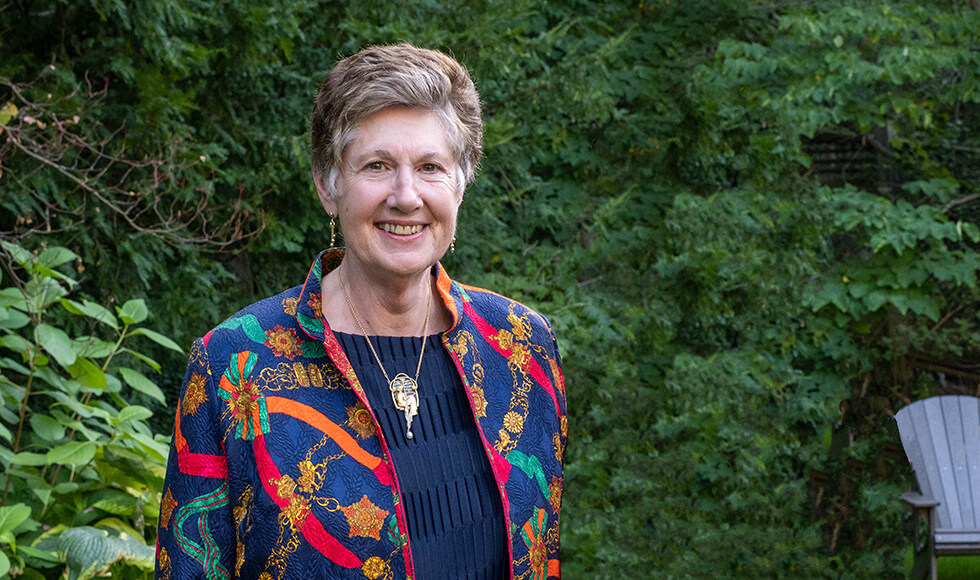

Older Canadians who are low-income, homeless or precariously housed face complex social barriers and challenges to their health and mobility, which have been amplified by the pandemic.
Suzanne Labarge, a McMaster University chancellor emerita and alumna, is investing $5 million in research to help improve the lives of marginalized and at-risk seniors, a group that is not often seen and heard.
Labarge’s gift will support the creation of the MIRA | Dixon Hall Centre, a unique partnership between the university’s McMaster Institute for Research on Aging (MIRA) and Dixon Hall, an established multi-service agency located in the heart of downtown Toronto.
“The new centre will leverage the research strengths of McMaster University and MIRA, while providing experienced leadership in community-engaged initiatives serving older adults in Toronto and beyond,” said Labarge, a former RBC executive and Order of Canada recipient who holds a McMaster economics degree and a Harvard MBA. “I am eager to see what findings the research projects will uncover and how the research can improve how older Canadians deal with multiple challenges.”
MIRA and Dixon Hall will collaborate to enhance research with, and services for, older people living in Toronto who are facing housing insecurity, barriers to transportation, and transitions in care, such as hospital-to-home and end-of-life.
“The goal is to improve quality of life through purposeful initiatives planned over both the short- and long-term,” said Christine Chow, Director of Seniors Services for Dixon Hall. “It is exciting to think about the voices and experiences of our clients being captured as part of this work. So often they go unheard.”
Labarge has supported McMaster and various aspects of aging research for 25 years. In 2007, she endowed the Raymond and Margaret Labarge Chair in Research and Knowledge Application for Optimal Aging in tribute to her parents. Her generosity supported the creation of the Labarge Optimal Aging Initiative, which includes the McMaster Optimal Aging Portal, a public website that provides older adults and their caregivers with trusted, evidence-based information on how to stay healthy, active and engaged. In 2016, her support created the Labarge Centre for Mobility in Aging, which was established to amplify interdisciplinary research initiatives that mitigate the risk and consequences of declining mobility with age.
McMaster President David Farrar said aging is a top university research priority.
“We are immensely grateful for Suzanne Labarge’s continued commitment to and keen interest in our researchers’ world-class research into aging,” said Farrar. “With her leadership and generosity, McMaster has grown to be a powerhouse in understanding and improving health and well-being throughout the aging process. This new partnership with Dixon Hall is another example of the way in which collaboration and expertise can make a remarkable impact.”
A friend to Dixon Hall as well, Labarge’s most recent contribution is assisting with technology: enabling critical enhancements to client data storage, as well as supporting client connectivity, something that has never been more vital than during the COVID-19 pandemic.
“Ms. Labarge has been a long-time friend to Dixon Hall and her most recent contribution has assisted with technological procurement enabling critical enhancements to client data storage, as well as enriching client connectivity, something that has been vital for our agency during the COVID-19 pandemic,” said Mercedes Watson, Dixon Hall’s CEO.
Currently, COVID-19 has heightened challenges for many of Dixon Hall’s clients, and for its role as service provider. Isolation, lack of access to technology, and food insecurity have been particularly critical. With MIRA as a partner, these challenges will be analyzed to create promising opportunities for collaborative work.
“The everyday realities of vulnerable seniors are exacerbated by imposed COVID-19 restrictions. Social isolation is more pronounced and social mobility is stymied,” said Parminder Raina, who holds the Raymond and Margaret Labarge Chair in Research and Knowledge Application for Optimal Aging. He is scientific director of MIRA and principal investigator of the Canadian Longitudinal Study on Aging (CLSA), a national study that follows 50,000 older adults for 20 years in order to collect data on how different biological, medical, lifestyle and economic factors impact the way they age.
“There is an urgency to consider the pandemic-specific issues facing older adults in the larger area Dixon Hall represents, since the exploration of these challenges will inform future areas of inquiry and inform decisions on program design for these populations,” he added.
Some initiatives that will be undertaken immediately include:
- collecting data on COVID-19 experiences from Dixon Hall clients, including the impact on their health and well-being
- engagement in “Stay Healthy and Safe at Home,” a project proposed to the Ontario Ministry for Seniors and Accessibility by MIRA that will provide standardized training and access to resources for staff and volunteers who work with service providers and programs
- and a robust exploration and observational study of the impact of technology and connectedness on Dixon Hall clients.
About the McMaster Institute for Research on Aging
The McMaster Institute for Research on Aging (MIRA) aims to optimize the longevity of Canada’s aging population through research, education, and collaboration. Interdisciplinary teams work alongside older adults and key stakeholders to find ways that will help Canadians spend more years living well.
About Dixon Hall
Dixon Hall is a multi-service agency celebrated for its commitment to comprehensive client care, particularly in its suite of programs supporting seniors in downtown East Toronto. Other areas of work include housing and employment services, a music school, and other supports for children, youth, and families.







































